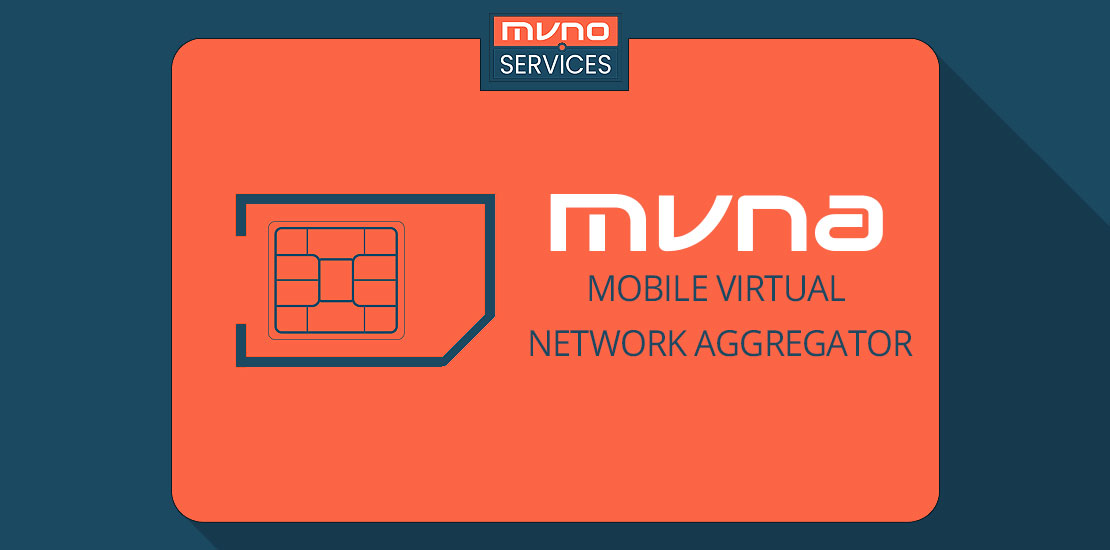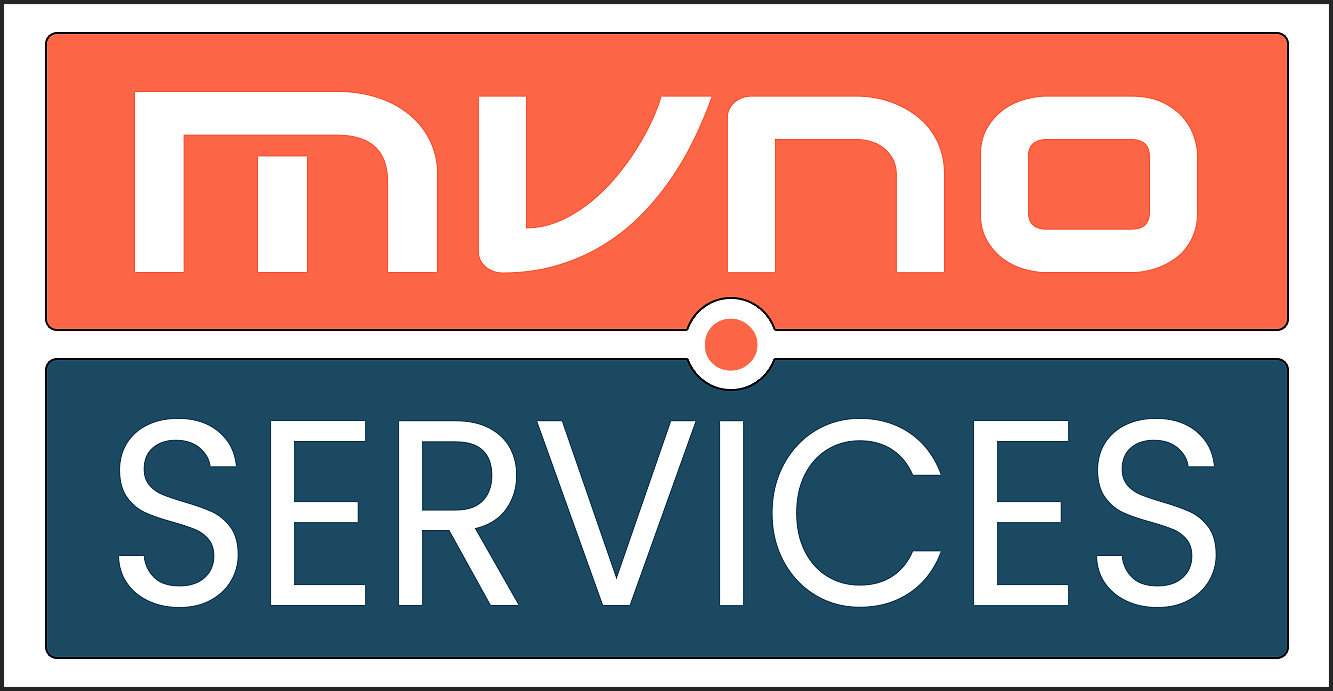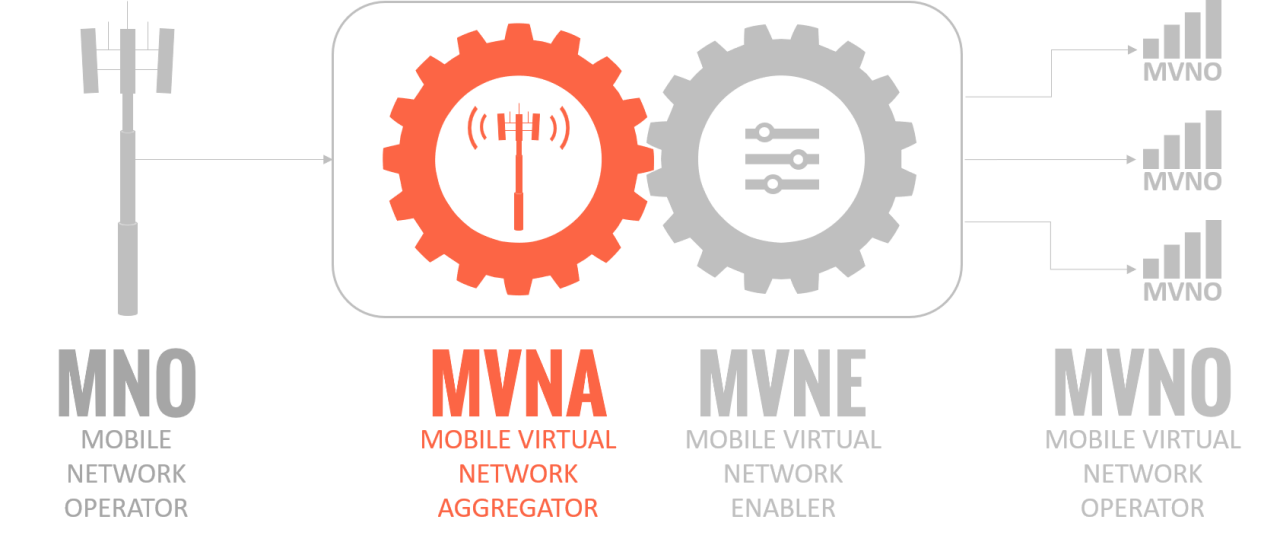What is a Mobile Virtual Network Aggregator (MVNA) and Its Role in the MVNO Ecosystem?
- November 14, 2024
- Posted by: Allan Rasmussen
- Category: MVNO Academy

Mobile Virtual Network Aggregator (MVNA) and its role in the MVNA, MVNE, MVNO, MNO ecosystem
What is a Mobile Virtual Network Aggregator (MVNA), and what role does it play in the MVNO ecosystem?
A Mobile Virtual Network Aggregator (MVNA), aggregates mobile airtime in bulk from the mobile network operator (MNO), and then wholesale this airtime along with its own services to multiple MVNOs.
Aggregate, comes from the Latin verb, “aggregāre”, which means, to add to – or collect into a mass or whole.
Hence, a Mobile Virtual Network Aggregator (MVNA) is an B2B entity, which acquires mobile airtime in large bulks from one – or several mobile network operators (MNO), and then wholesale this airtime and its own services to multiple Mobile Virtual Network Operators (MVNO), who each in turn sells the mobile service to end-users.
The MVNA acts as a middle-man between the mobile operator (MNO) and the MVNOs and does not serve end-users.
The role and benefits of MVNA in the MVNO ecosystem
MVNAs have streamlined the entry of MVNOs into the market by making airtime processes more efficient for both mobile network operators (MNO) and mobile virtual network operators (MVNO).
Individually, MVNOs lack the scale to negotiate favorable wholesale pricing with MNOs. However, by consolidating the purchasing power of multiple MVNOs, the MVNA can take advantage of economies of scale and secure bulk deals with MNOs, at discounted rates, passing these savings on to their MVNO clients.
This creates a win-win situation for both the MVNO, MVNA and MNO, similar to traditional manufacturing, wholesale, and retail models.
Furthermore, an MVNA can offer an additional layer of security for MVNOs. By sharing business models and KPIs with the MVNA, rather than directly with MNOs, MVNOs can mitigate the risk of their innovative services and promotions being copied and launched prematurely by the MNO.
What to look for in a MVNA
MVNAs must have the ability to conceptualize and develop customized mobile offers that align with the unique needs and strategies of each MVNO partner. This requires a deep understanding of the MVNO’s target market, brand identity, and service requirements.
The increasing popularity of eSIM technology will drive the need for MVNAs to negotiate complex agreements between multiple mobile operators, enabling seamless roaming experiences for subscribers as they travel across borders.
To effectively support their MVNO partners, MVNAs must have a solid understanding of the mobile industry, including network technologies, pricing strategies, and customer behavior.
This knowledge will be essential for analyzing MVNO business models, validating subscriber and traffic forecasts, and maintaining strong relationships with both MNOs and MVNOs.
In example:
- Identify the niche and value proposition,
- Customer Segmentation and needs,
- Product Portfolio,
- Tariffs, Bundles, Voucher, Fraud,
- Advertising and Promotions,
- Subscriber Analysis,
- New Product and Application Specification.
- Legal compliance,
- Definition of sales & payment channels
- SIM Cards,
- Channel, and Distribution Management.
- Business Intelligence Reporting,
- Bundle and promotion offer development,
- Customer acquisitions & retention campaigns,
- Improvement of operational processes,
- ARPU, Churn management,
- Best time to market (launch services),
- Flexible and enhanced life cycle configuration.
The role of the MVNA, is to be a strategic partner for the MVNOs, providing guidance and support in areas such as marketing strategy development, customer acquisition campaigns, and channel partner selection.
Many aspiring MVNOs may not possess the necessary telecom industry knowledge to effectively execute these functions independently.
To ensure long-term success, the MVNA must cultivate strong and adaptable relationships with both MNOs and MVNOs. This requires a collaborative approach, open communication, and a shared vision for growth.
The MVNA need to negotiate favorable wholesale network agreements with MNOs that offer competitive pricing, flexible terms, and reliable service quality.
To efficiently manage and optimize operations, an MVNA may choose to invest in their own infrastructure or partner with a Mobile Virtual Network Enabler (MVNE) to provide essential services such as billing, monitoring, reporting, number management, and business intelligence.
MVNA vs. MVNO
In some countries, the telecom regulators have allowed MVNOs to act as an MVNA as well. This is mainly due to many MVNOs seeing an opportunity in expanding there business into reselling their network access to other smaller MVNOs. There is however a range of issues using an MVNO to act as a MVNA.
MVNOs, are direct providers of services to end-users, and are therefore subject to specific consumer protection laws and regulations. They must establish robust customer support systems to address customer inquiries and complaints. In contrast, an MVNA does not have interactions with end-users and therefore does not require the same level of customer support infrastructure.
There is also a strong conflict of interest when an MVNO acts as an MVNA, as it will have access to the data of its MVNO clients, and may prioritize its own end-user business over the needs of its MVNO clients.
Furthermore, what happens if the MVNO that is also acting as a MVNA by providing service to other MVNOs – goes out of business? Who will take over the operation to maintain connection for the other MVNOs? In such a scenario, ensuring the continuity of service for these MVNOs could be challenging.
To address these issues, most regulatory authorities who has a licensing scheme in place for MVNA/MVNO, have opted to separate MVNO and MVNA licenses into distinct categories. This approach allows for tailored application processes, specific licensing requirements, and differentiated regulatory treatment for each business model.
บริการ Mobile Virtual Network Aggregator (MVNA)
บริการ mobile virtual network aggregator (MVNA): หมายความว่า MVNA ที่ได้รับอนุญาตให้ขายส่งบริการโทรศัพท์เคลื่อนที่แก่ผู้ให้บริการ MVNO.
MVNA (Mobile Virtual Network Aggregator) เป็นบริษัทที่ทำหน้าที่เป็นตัวกลางระหว่างผู้ให้บริการเครือข่ายหลัก (MNO) และผู้ให้บริการโทรศัพท์เคลื่อนที่แบบโครงข่ายเสมือน (MVNO) โดยให้บริการโครงสร้างพื้นฐานและสนับสนุนด้านต่างๆ เพื่อช่วยให้ MVNO สามารถเปิดตัวบริการได้ง่ายขึ้นตุ้นเศรษฐกิจและสร้างงาน
บทบาทหลักของ MVNA
- การจัดหาทรัพยากรเครือข่าย: MVNA จะจัดหาทรัพยากรเครือข่าย เช่น คลื่นความถี่, โครงสร้างพื้นฐาน และบริการเสริม จาก MNO เพื่อให้บริการแก่ MVNO
- การให้บริการแพลตฟอร์ม: MVNA มักจะให้บริการแพลตฟอร์มเทคโนโลยีที่จำเป็นแก่ MVNO เพื่อให้สามารถดำเนินธุรกิจได้อย่างมีประสิทธิภาพ
- การจัดการเครือข่าย: MVNA อาจรับผิดชอบในการจัดการเครือข่ายเสมือนของ MVNO เพื่อให้มั่นใจว่าบริการมีความเสถียรและมีคุณภาพ
- การสนับสนุนด้านธุรกิจ: MVNA สามารถให้การสนับสนุนด้านธุรกิจแก่ MVNO เช่น การจัดการลูกค้า, การเรียกเก็บเงิน และการตลาด
ประโยชน์ของ MVNA
- ลดต้นทุน: MVNA ช่วยลดต้นทุนในการตั้งค่าและดำเนินงานของ MVNO โดยการแบ่งปันทรัพยากรและแพลตฟอร์ม
- เพิ่มความเร็วในการเปิดตัว: MVNA ช่วยเร่งกระบวนการเปิดตัวบริการของ MVNO โดยการจัดหาทรัพยากรและแพลตฟอร์มที่พร้อมใช้งาน
- เพิ่มความยืดหยุ่น: MVNA ช่วยให้ MVNO มีความยืดหยุ่นในการปรับเปลี่ยนบริการและแพ็กเกจเพื่อตอบสนองความต้องการของลูกค้าได้อย่างรวดเร็ว
- เพิ่มโอกาสทางธุรกิจ: MVNA สามารถช่วย MVNO ขยายธุรกิจไปยังตลาดใหม่ๆ และเพิ่มโอกาสทางธุรกิจใหม่ๆ
ตัวอย่าง MVNA
- MVNO.SERVICES เป็นตัวอย่างของ MVNA ในประเทศไทยที่กำลังเติบโตและมีบทบาทสำคัญในการพัฒนาตลาดโทรคมนาคม
โดยสรุป MVNA มีบทบาทสำคัญในการสนับสนุนการเติบโตของตลาดโทรคมนาคม โดยช่วยให้ MVNO สามารถเข้าสู่ตลาดได้ง่ายขึ้นและมีประสิทธิภาพมากขึ้น
MVNO.SERVICES ถือเป็นตัวอย่างที่ชัดเจนของ MVNA ในประเทศไทย ที่มีส่วนสำคัญในการผลักดันให้เกิดการแข่งขันและนวัตกรรมในตลาดโทรคมนาคมไทย โดยเฉพาะอย่างยิ่งในการสนับสนุน MVNO รายใหม่ๆ ที่ต้องการเข้ามาให้บริการในตลาด
บทบาทที่สำคัญของ MVNO.SERVICES
- การให้บริการแพลตฟอร์มที่ครบวงจร: MVNO.SERVICES มอบแพลตฟอร์มเทคโนโลยีที่ครบวงจรแก่ MVNO รายใหม่ ทำให้สามารถเริ่มต้นธุรกิจได้อย่างรวดเร็ว โดยไม่ต้องลงทุนในการพัฒนาระบบเองทั้งหมด
- การเชื่อมต่อกับเครือข่ายหลัก: MVNO.SERVICES ทำหน้าที่เป็นตัวกลางในการเชื่อมต่อ MVNO รายใหม่เข้ากับเครือข่ายหลักของผู้ให้บริการเครือข่ายหลัก (MNO) ช่วยลดขั้นตอนและความซับซ้อนในการเจรจาและทำสัญญา
- การสนับสนุนด้านเทคนิค: MVNO.SERVICES ให้บริการสนับสนุนด้านเทคนิคแก่ MVNO รายใหม่ เช่น การดูแลระบบ, การแก้ไขปัญหา และการพัฒนาบริการใหม่ๆ
- การให้คำปรึกษา: MVNO.SERVICES สามารถให้คำปรึกษาทางธุรกิจแก่ MVNO รายใหม่ ช่วยในการวางแผนธุรกิจ, การกำหนดกลยุทธ์ และการเลือกกลุ่มเป้าหมาย
- การลดต้นทุน: ด้วยการใช้แพลตฟอร์มและทรัพยากรที่ร่วมกัน MVNO รายใหม่สามารถลดต้นทุนในการเริ่มต้นธุรกิจได้อย่างมาก
ผลกระทบต่อตลาดโทรคมนาคมไทย
- เพิ่มความหลากหลายของบริการ: การมี MVNO รายใหม่เข้าสู่ตลาด ทำให้ผู้บริโภคมีทางเลือกในการเลือกใช้บริการที่หลากหลายมากขึ้น
- ลดราคาบริการ: การแข่งขันที่สูงขึ้นส่งผลให้ราคาบริการโทรคมนาคมมีแนวโน้มลดลง
- ส่งเสริมนวัตกรรม: MVNO รายใหม่มักจะนำเสนอบริการและแพ็กเกจที่แตกต่างและตอบโจทย์ความต้องการของผู้บริโภคกลุ่มเฉพาะได้ดีกว่า
- กระตุ้นเศรษฐกิจ: การเติบโตของตลาดโทรคมนาคมช่วยกระตุ้นเศรษฐกิจและสร้างงาน
Latest Post
MVNO Types & Operational Models Explained
What are the various mobile virtual network operator (MVNO) models, such as Thin MVNO, Medium and Full MVNO – and what are the benefits/disadvantages of these models?
October 31, 2024Mobile Virtual Network Operator (MVNO) | Official Definitions
Discover the official definitions of a Mobile Virtual Network Operator (MVNO) from various regulatory authorities and what a MVNO actually is
October 30, 202410 Key Factors for MVNO Success Explained: A Comprehensive Guide
What is actually needed to make a mobile virtual network operator (MVNO) successful? Here are 10 key factors for MVNO success explained.
July 1, 2024




